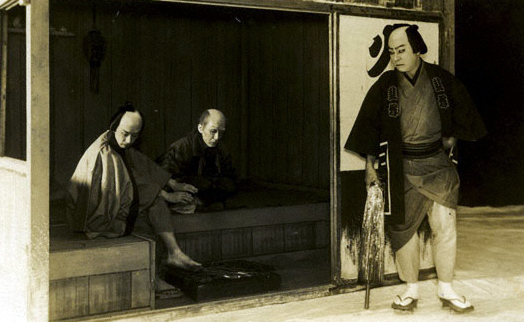| MUSUKO |
| Play titles | Musuko The Son |
| Author | Osanai Kaoru |
| History |
Osanai Kaoru's drama "Musuko" was premiered in March 1923 at the Imperial Theater [more details]. The story, which was based on Harold Chapin's 1910 drama "Augustus in Search of a Father", was first published in the magazine Mita Bungaku in July 1922. |
| Structure |
"Musuko" is made up of 1 act (1 scene). |
| Key words |
Bangoya Buraikan Hi-no-bangoya Hitomaku-mono Hon'anmono Hori Rôya Sewamono Shinkabuki Yuki |
| Summary |
It is a cold winter night [1] and it is snowing outside a fireguard hut (hi-no-bangoya) near Edo. The old man (rôya) in the hut is a grumpy fellow. He is huddled over a small fire. A police officer (hori) comes by and, after having walked back and forth near the hut for a while, he enters the hut to warm himself at the fire. The old man shows no sign of welcoming him. He answers only briefly and rudely to the officer's remarks. The police officer finally wanders off, leaving the old man grumbling by himself. Now another visitor comes to the hut. This time it is a young man, who has covered his head. He comes in shivering and asks for the permission to warm himself at the fire. As it is not unusual for strangers to stop by at the fireguard hut, the old man agrees to let the young man come in. Then he starts to ask a few casual questions but he notes that, even in the answers to the simplest questions, there are oddities. The old man says nothing as the life of this stranger is none of his business. Seeing that the other is about to faint from hunger, he offers leftovers from his own meal, and the stranger eats ravenously. At first, the stranger has said that he has been a merchant, but gradually he reveals more of the truth, and says that he has been making a living as a gambler. It also appears that he knows many of the neighborhood bad guys and that he used to live in this area. Actually, the stranger is none other than the old man's son Kinjirô. He left his home nine years ago dreaming of achieving financial success in Ôsaka. The old man has not heard from his son since, but he is firmly convinced that his son is living a successful life somewhere in Ôsaka. Unfortunately, Kinjirô has fallen into bad ways. He is now a buraikan on the list of wanted people and he has come back to Edo wishing to see his parents once more before his capture. He knows that the old man is his father, but listening to the old man expressing his firm belief that his son is doing well in Ôsaka, he cannot find the courage to reveal his identity and he keeps his face hidden. As they are talking together, the police officer (hori) comes back again and stops to listen to the conversation from outside. He is quite sure that the stranger is the man he is looking for. He decided to steps in. Kinjirô exchanges a few jokes with him, but is uneasy, and starts to take his leave. The police officer tries to arrest him but Kinjirô starts to run away. Pursued by the officer, Kinjirô runs back again in the direction of the hut but he stumbles and is caught. He offers little resistance, seemingly resigned to be arrested. When the police officer tries to pull him in the hut to have a better look at his facial features through the light from the fire, he frantically resists as he does not want his father to recognize him. He shoves off the police officer and runs off again. The police officer stands up and goes off in chase in the wrong direction. Once again, Kinjirô draws near the hut and calls to the old man inside, asking whether his wife is well. The old man replies gruffly that his wife has died, and tells the fugitive brusquely to run away. Kinjirô runs off again after whispering "father" [2] softly under his breath. |
| Trivia |
The set, the simple hut (bangoya), the black night and the snow (yuki), which was designed by Tanaka Ryô (1884~1974), created an elegant and refined stage atmosphere. |
| Notes |
[1] The play is set in the 12th lunar month at the end of the Edo period (Bakumatsu). [2] Covered by the sound of the falling snow, only chan can be heard. Chan is the end of the word otôchan or more simply tôchan, which means pops or daddy more than father. |
 |
|
The actors Bandô Shûka III, Bandô Minosuke VI and Ichikawa Danshirô III playing the roles of Kinjirô, the old man and the police officer in the drama "Musuko", which was staged in March 1934 at the Shinjuku Shinkabukiza |
|
|
| Contact | Main | Top | Updates | Actors | Plays | Playwrights | Programs | Links | FAQ | Glossary | Chronology | Illustrations | Prints | Characters | Derivatives | Theaters | Coming soon | News |